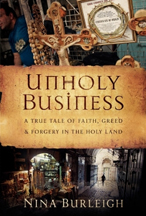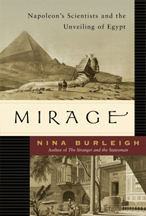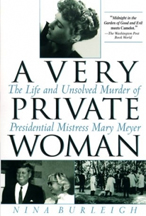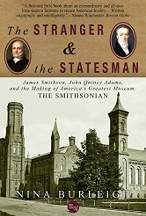
I don't know when I decided to invite my mother along. The mere fact that I was seriously considering it felt as though it were proof of incipient middle age. I used to travel to exotic places to get away from my family
There were obvious difficulties to making my plan work. Arthritic knees were slowing her down. She was deeply afraid of flying. My mother had flown to New York from Chicago, where she lives, on the night my son was born, but for all subsequent visits, she chose two pungent days on Amtrak instead of two white-knuckled hours in the air. What's more, I could not imagine spending almost three weeks with her. Just the two of us. In a hot Islamic country, post 9/11, post-American invasion of Iraq.
But I was researching a book about the founders of Egyptology, and I'd already squandered most of my budget on travel and translators. My Iraqi-born mother could speak and read Arabic fluently and would presumably work gratis. True, she didn't know her way around Cairo, but Middle Eastern cities have a certain chaotic similarity. Bonus good-daughter points: Mom had always wanted to see Egypt.
GO TO THAT BLESSED COUNTRY
An Assyrian Christian born in northern Iraq, my mother, Berta, emigrated alone to the United States in 1957. The act was so out of character for the timorous, often depressed woman who raised me that it took me years to acknowledge just how brave she must have been. She landed on the shores of Norfolk, Virginia, where she stayed with Presbyterian missionaries. Her first impressions were not good. Upon seeing the black-haired, olive-skinned woman walking in the road, a neighbor helpfully warned her that somebody might burn a cross on her host's lawn. My mother was already in her late twenties, with a college degree in English, and had left behind her family and a good job as a translator with a British- owned oil company in Kirkuk. She was dispatched to the U.S. to keep a big-sister eye on her brother, who'd been sent to study at a small college and was believed to be goofing off. And she was sent away be- cause of political leanings-- Anglophilic and leftist--that were becoming dangerous in a country roiled by nationalist ideology. She was also fulfilling a broader family mission. My grandmother was a tough woman who had survived the Ottoman ethnic cleansing of Assyrian villages in Iraq during the 1920s. American missionaries had helped her escape, and she never forgot them, often telling my mother, "Go to that blessed country."
My mother married a blond, basketball-playing poet, became a citizen and raised three American kids. She never taught us Assyrian or anything about her culture, although she did take us to Iraq for several months to visit relatives the year after the Summer of Love. Dad stayed behind in San Francisco, where we lived, and sent her a hot-pink, paisley mini- dress, an outrageous gift to receive in Baghdad even then and one I later recognized as the beginning of the failure of their marriage. My mother returned to Iraq only once more, just before the first Persian Gulf War.
During that conflict, I thought I understood her grief. I will never forget walking with her along the shore of Lake Michigan in February 1991. She looked old, beaten and unspeakably sad. The blessed country was bombing the country of her youth, and all she could do was watch it unfold on television. She had no affection for Saddam Hussein--after her last trip in the late 1980s, she talked for months about the cruelty of his totalitarian system, how friends and family felt required to hang pictures of the despot in their living rooms--but now that he was under attack, she proclaimed that the Americans were really after the oil fields. When President George W. Bush launched the second war, my mother was no longer passive and depressed but livid and radicalized. Although she's a technophobe, she had a satellite dish installed so she could watch Al Jazeera day and night. Needless to say, she suspects 9/11 was a U.S. government conspiracy.
AN EXPAT IN EGYPT
The Egyptian tourism industry has been so damaged by terrorism that the government subsidizes tours for Europeans and Americans. Less than $2,000 buys airfare to Cairo, two-and-a-half weeks in the best hotels and a four- day cruise up the Nile.
We had been in Cairo for less than an hour when he showed up: a tall, blond man in his thirties who introduced himself as a member of our tour group and fetched us sodas while we sat through an interminable lecture on the itinerary. Blake, a labor lawyer from Seattle taking a round-the-world trip after the recent death of his wife, became our escort, appearing whenever we were about to eat and behaving with the utmost solicitousness toward my mother. Being in the mother-daughter-young widower triangle made me feel as if I were a character in an E. M. Forster novel.
In the era of the Patriot Act, the sud- den appearance of a courtly American made me suspicious, but my mother (who believes her phone has been tapped by the FBI ever since she marched against the Vietnam War) didn't find anything odd about our friend. This time, I was the paranoid conspiracy theorist.
Our first few nights in Egypt, we stayed at the palatial Mena House Oberoi Hotel, in Giza. I wanted to loll poolside under the shadow of the pyramids with white-coated waiters bringing me drinks, but the luxury made my mother, a retired teacher, uncomfortable. I could tell the scene reminded her of British colonialists whose presence in Iraq she still blames for the country's demise.
I also soon realized that my mother was going to be less than the ideal guide in at least one crucial area: bartering. Negotiation is the basis of commerce in Arab countries, but rather than haggle, my mother opened her wallet, bulging with Egyptian pounds, and let spill. She paid the equivalent of $50 to have one piece of clothing laundered by a valet who told her that he had a sick wife at home.
After a week of incessant clashes over money, I decided that she was behaving this way not just out of helplessness--a habit I'd always attributed to being raised female in a Muslim country--but also out of emigration guilt. When middle-class Iraqis lost their jobs and savings in the 1990s, she was buying a house and living off a not princely but certainly adequate retirement income in suburban Chicago.
THE ARAB STREET
Pundits often use "the Arab street" as a synonym for public opinion in the Middle East, with its inference-- intended or not--of unwashed, illiterate, looting masses. It is but one of the casually insulting tropes I recognize thanks to my mother, who has taken notice of every offense over the years, so that now, in her mid-seventies, she is a walking encyclopedia of racial grievances. My own earliest encounter with the Arab street dates to 1968: It is a hot summer day, and I am walking with my mother in downtown Baghdad. All I can see are begging children around us. Their dirty hands are everywhere, their voices pleading for money, candy, anything. I want to run away.
The next experience came on my first trip to Baghdad as a journalist. I was covering the end of the first war, and among the journalists I met was a French photographer named Fifi, who, I swear, wore a leotard and a tutu to take pictures of Saddam's revenge on the Shiite rebellion. I knew better than to dress that way, but I still felt a secret thrill walking with my arms swinging and my head bare. I even thought I detected a certain admiration from "the street."
But that was before. Our trip to Egypt was my first to the region since September 11, and what I saw in the covert glances from women now was not veiled admiration for my freedom but loathing of me and my American female confidence. The prickly feeling I had on the back of my neck abated only when I walked around with my mother. If anyone muttered in our direction, she'd smile brightly and say something pleasant in Arabic. Instant- ly, she was surrounded. High school girls in Alexandria, shopkeepers in the souk, maids and cab drivers all circled around to gaze upon an Iraqi woman from the land of Bush. She blushed at the attention, and I could see that hearing Arabic transported her to a happier time.
My mother never felt pressure to cover her head when she was in Egypt--or growing up in Iraq. As a teenager, her mother had half-jokingly suggested that she start wearing an abaya outdoors. "No way," my mother replied. At JFK airport, on our way to Egypt, we eyed with disdain women who not only covered their heads, but their faces, ankles and fingertips, full partners in their own subservience. "Look how she walks behind her husband," my mother hissed. "Do you think she dresses that way to hide the bruises?" I asked. As a Christian in a Muslim country, my mother was profoundly influenced by the dominant culture, and she gives Islam the benefit of the doubt on misogyny. She believes that "true Muslims"--not the Osama bin Laden extremist sort--respect women; that in Iraq, anyway, they have decision- making power inside the home.
The biggest argument that erupted between us on the trip was about this very issue. Our hotel room was 24 stories above the Nile. Directly beneath us were hundreds of acres of yellow tombs that make up the City of the Dead, a medieval cemetery inhabited also by the living, whose presence is indicated by proliferating satellite dishes on the roofs of the tombs. We were sitting on our beds, eating pizza and watching the same flickering wall decor we'd had in every hotel room: Chanting throngs of men hoisting banners with Arabic script scrawled in green, the color of the Prophet Mohammed. I couldn't tell where the protesters were, but I didn't need translation to know the focus of their rage.
I could sense my mother warming to their side, and I felt an irresistible urge to refute her. What I saw were masses of fanatics, men without women who would just as soon wrap me in a suffocating black blanket and stone me.
"What's their problem?" I asked.
"What do you think?" my mother replied, glaring at me. "You don't feel any compassion for these people, do you? Don't you understand that colonialism did this to them? Don't you understand that it has caused my problems and yours?" Ha! It never took her long to resort to an ad hominem attack. It wasn't colonialism, I replied, but sexism and misogyny behind the region's troubles. Uttering an expletive, she rolled over and buried her head in a book. It was another move I'd seen a thousand times before: discussion closed.
Even a year later, as the Iraqis pre- pared to write a constitution that would restrict the rights of women, my mother still wouldn't blame the boys, and I was still trying to coax her into it. I know that she has no real affinity for the Muslim theocrats and their suicidal agents, but they do represent a satisfying response to the abuses and disappointments she feels she has endured at the hands of one man in particular: the blond, blue-eyed man from whom she has been divorced for two decades and whom she never forgave for enjoying life while she toiled.
FEAR OF FLYING
We cruised up the Nile to Aswan, dock- ing at Luxor, Thebes, Edfu and Kom Ombo, where the heat rose and rose. In Edfu, we took a horse-drawn carriage to the temple of Horus, its 2,300-year-old walls etched with giant hawk- and cow-headed deities of wisdom and love. My mother's arthritic knees were bothering her after a week of trekking around Cairo, but she was still enthusiastic. I didn't realize just how happy she was until I got home and developed the film. In one picture, she is sitting on the ship's deck with a smile on her face that I've seen only once before, in a photo taken long before I was born, at a family picnic in Iraq.
When the time came to return to Cairo, the plane was running be- hind schedule. I had ample opportunity to inspect my fellow passengers and notice the black smudges on the foreheads of the observant men who pray with their faces flat to the earth. Could any of them be angry enough at Western civilization to blow up a tourist-filled puddle jumper? As we lined up on the tarmac, I was fighting off a fear infection.
The ancient plane rattled wildly as we took off. I averted my eyes from the quaking wing outside my window and began deep-breathing exercises. My mother gazed serenely at the expanding terrain below, which was rocky and barren, except for a shrinking strip of green along the Nile. Two hours later, the plane was descending into the petroleum-smudged brown egg of Cairo. As planes sometimes do on descent, we seemed to pause in mid-air. The sky was clear, but the wind was fierce. Suddenly overcome with mortal dread, I reached my hand over the divider to my mother's wrist. Soft, dry, cool. I clamped down hard. She turned away from the window and, recognizing in my terror what she had somehow discarded, her beatitude turned to amusement.
ONE-WAY TICKET TO IRAQ
For a few months after our trip, my mother was a changed woman. She fearlessly boarded a Chicago-bound flight delayed by weather and reported feeling no anxiety as she bounced westward over tornado systems. "Oh, I really want to travel more," she'd say.
But once back in Chicago, the city of her grown children and retired colleagues, the globe-trotting character soon settled into the armchair in front of Al Jazeera. She watches television, absorbing scenes of gore from her native land. What of that woman drawing crowds on an Arab street and feeling so energized that the ache in her knees was barely a distraction? That was my mother, yes, but it was also a woman in a time machine, a woman whom I have had the privilege of seeing once and most likely never will again.
Although she did tell me recently that there is a one-way ticket she'd like to have: She wants to go back to Iraq. It's unfathomable to me, a lunatic idea. "You'll get killed," I tell her for conversation's sake.
"I don't care," she says. "I just want to go there and disappear."
I don't have the heart to point out the irony to her, that the woman who never wore a veil and refused to be invisible when she lived there now wants to use the country of her birth to help her disappear.
It's not that she really wants to live in Iraq, but that she remembers a life that existed there before despair set in. Our trip to Egypt momentarily rekindled a flicker of what she misses. There is a Borges poem about life being ultimately a shipwreck, and I think about that when I consider my mother: She traveled around the globe to get where she is, but today, beached and unable to continue, her mind is filled with literal images of the wreckage of home.








Leave a comment